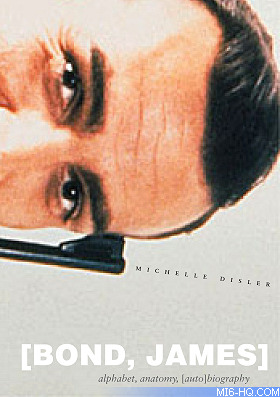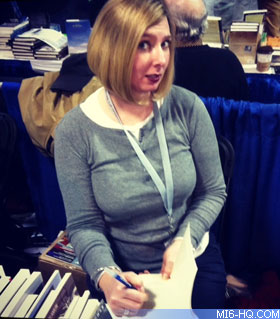|
|
|
 |
| |
MI6 caught up with author Michelle Disler to chat about her unique Bond-inspired book, [Bond, James] and Fleming's iconic character...
|
|
Michelle Disler Interview
13th March 2012
Michelle Disler is the author of [Bond, James]: Alphabet, Anatomy, [Auto]Biography, a sobering examination of the ultimate spy-styled popular thriller, a nuanced deconstruction of model masculinity in mass culture. Recently Michelle made time to speak with MI6 about the creation of the book and her scholarly take on the literary character of James Bond 007.
How did the idea for the book [Bond, James] come about?
Before the book, I had wanted for some time to write a "Bond Essay," and had made a few failed attempts. While I was at work on my dissertation, and reading works like MFK Fisher's "An Alphabet for Gourmets" and Gertrude Stein's "Tender Buttons," a vision for this book started to appear, and I began writing "essays" for each letter of the alphabet on a topic related to the Bond I had come to know in the Fleming novels.
How long did the book take to compile?
I think it took less than a year, only perhaps because I was writing fast and furiously as one often does while at work on their dissertation as it nears completion. All total the book took four years from the initial draft which is a part of my dissertation and the process of finding a publisher and completion of the publishing process itself.
Would you describe yourself as a Bond 'fan' and what initially drew you to the series?
I would describe myself as a Bond Fan, though what initially drew me to the series wasn't the films I watched at a young age but the novels I read in a theory class in my doctoral program. The Bond I saw in Fleming's novels was more attractive than the on-screen Bond; this Bond was fallible, and however tough, often made dangerous mistakes.
Were you involved in choosing the photograph? Is it Connery, or someone else, you imagine when reading Fleming's work?
Counterpath Press chose the cover image and designed the book jacket. I'm not sure who I envision when I read Fleming novels, but certainly not the on-screen Bond the Bond Film Franchise has popularized over the years, though I do enjoy the films. |
|

Above: Cover art for Michelle Disler's [Bond, James] from Counterpath.
 Order Amazon USA Order Amazon USA
|
You teach an English course that focuses on the espionage genre at Ohio Wesleyan University. Did this book inspire the course or vice versa? In addition, how do you feel 007 fits into the espionage genre more broadly?
I've taught Bond themed courses several times prior to the writing and publication of the book, so the research that went into building the Bond classes probably influenced the writing of the book. As for 007 fitting into espionage more broadly, I do think Fleming owes a debt to his contemporaries and those who came before him, like D Hammett and Kingsley Amis and Sir Arthur Conan Doyle.

|
|
Do you have any strong opinions on "The Spy Who Loved Me", the novel when Fleming broke the mould and wrote from a perspective not that of James Bond? Fans tend to shy away from it but, in your opinion, how does it stand within the series?
It's my understanding that the reviews for the book were so very critical--rightly so, I think; it reads like a "rape fantasy" gone wrong, if that makes sense--Fleming made certain it wouldn't be made into a film, but that the title could be used again, and it was, in a Bond film starring Roger Moore. It's really an awful book--I can't imagine what Fleming was thinking. Misogyny features so prominently in all the Bond novels I'm not sure why Fleming took such a risk with. "The Spy Who Loved Me," which I think makes the misogyny in all his other novels seem acceptable.
Do you have a favourite Fleming novel and what about it makes it stand out for you?
Casino Royale. Readers meet the iconic spy for the first
time, and in doing so discover a rich and surprising history
about the iconic spy.
Right: First edition cover art for Ian Fleming's 'rogue' Bond novel, 'The Spy Who Loved Me'. |
When reading [Bond, James] we are alerted to the fact that Bond is a creature of habit and that Fleming consistently used similar turns of phrase. Was this something that you had noticed prior to writing [Bond, James] and do you think it's an attractive part of the novels as a series?
I think I did notice the repetition in the first few novels I read as a doctoral student, and it became a game for me: how many cold showers can one tough guy take? How many double agent women could he possibly mistake for women who loved him? He really smokes 70 cigarettes a day? He really always reaches for his gun under his pillow as he falls asleep? I found it somehow endearing, funny, and conceptually, readers have said it's artful and smart and "How on earth did you come up with all this?" The writing of the book was really quite fun, however unscientific my "findings" are.
In researching the book did you begin to look at Fleming's work with new eyes? If so, what changed in your opinion of the series before and after this project?
I remember reading the Bond novels with the startling realization that Bond was human, trusted his gut, made mistakes, loved double-crossing women spies--he's really a detective, without gadgets and cars and women his trusty Q to suit him up for one mission after the next, which also had me thinking about my dad as a person rather than only a detective--that was startling to me as well. Bond is a detective who trusts his gut and is often wrong, his fate uncertain as a result. My dad is a man whose detective work defined him so very much it was difficult to see the man and the father as well and to credit the man and the father rather than only worshipping the detective.
Right: Disler signing copies of [Bond, James] at the national writer's conference in Chicago. |
|

|
[Bond, James] is a varied mix of prose and poetry constructed from Fleming's images and unique analyses of the literary series. But, how would you describe your work to the casual reader or fan of the literary Bond?
This work is fresh and smart and ready for whomever is willing
to spend time with it in the way I learned to spend time with Bond
the Detective and My Dad the Man as Detective. The book is fun,
surprising; my hope is that readers of all kinds will be open to
its experimental nature and that readers will also be lead to the
Fleming novels, which are the main inspiration for the book.
Related Articles
 [Bond, James] - Book Preview [Bond, James] - Book Preview
|
|
|